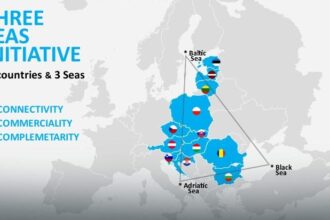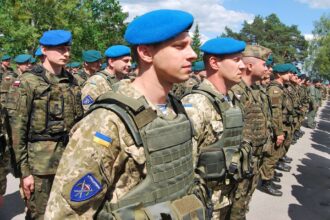The World Bank’s Economic update for the region released today shows that the war against Ukraine and the sanctions on Russia will affect economies all over the world. Emerging market and developing countries from Europe and Central Asia are expected to be the hardest hit.
The COVID-19 pandemic and the economic shocks of the war will compound the impact of the region’s economy. This would be the region’s second contraction in the last two years, and double the size of the pandemic-induced recession in 2020.
Ukraine’s economy will shrink by approximately 45,1%. However, the exact magnitude of this contraction will depend on both the duration and intensity the war. Russia’s economy, already in a deep recession due to unprecedented sanctions, is expected to contract by 11.2% percent by 2022.
The humanitarian crisis that has been unleashed is of staggering magnitude. The Russian invasion has caused a major blow to Ukraine’s infrastructure and economy. Anna Bjerde is the Vice President of the World Bank for Europe and Central Asia. “Ukraine urgently needs massive financial assistance as it struggles with keeping its economy running and the government operating to support Ukrainians who are suffering in an extreme situation.”
The war in Ukraine will also have a negative impact on the Georgian economy, through reduced trade, tourism, and remittances as well as increased commodity prices. Due to the uncertainty and disruptions in supplies from Russia and Ukraine, oil and food prices have risen sharply since the start of the war. These impacts will lead to a slowdown of growth. The initial growth forecast for 2022 was 5.5 percent, but is expected to drop to just 2.5 percent. The baseline outlook anticipates a recovery in growth from 2023, as the withdrawal of fiscal stimuli, the recovery of tourism and the restoration of economic ties are partially offset by easing of monetary policy.
“While we expect a slowdown in the growth rate for 2022, Georgia will be well-positioned to manage the economic fallout from the war because of its reasonable fiscal and external cushions and a credible macrofinancial structure. The banking sector enters the crisis in relatively good shape, government deposit are large, and debt will likely remain sustainable,” said Sebastian Molineus. World Bank Regional Director of the South Caucasus. “What’s needed is to continue with prudent management of the economy, support affected businesses and households, and reinvigorate structural reforms in order to improve productivity, human capital, and address climate change consequences,” said Sebastian Molineus, World Bank Regional Director for the South Caucasus.
The war has exacerbated the mounting concerns about a global slowdown and inflation, debt and poverty. The economic impact of the war has reverberated in multiple channels including commodity and financial market, trade and migration links, and adverse impact on trust.
The war’s deep humanitarian crisis has been the most pronounced shockwaves around the world and will be one of the most lasting legacies. The number of refugees fleeing Ukraine for neighboring countries will dwarf any previous crisis. The World Bank is preparing programs of operational support for neighboring countries in order to meet the increased financial needs due to the refugee flow.
The spike in oil prices caused by the war also highlights the need for energy safety. This can be achieved by increasing energy supply from renewable resources and increasing the design and implementation large-scale energy efficiency initiatives.
World Bank Group Response on the Ukraine War
The World Bank Group has taken swift action to support Ukraine. The Bank Group has mobilized a $925 million emergency financing package to support Ukraine since the beginning of the Russian invasion on February 24. This rapid support will be used to pay hospital workers’ wages, pensions for elderly people, and social programs for those who are most vulnerable. The rapid financing is a part of a package of $3 billion in support that the Bank Group will be preparing for Ukraine in the coming months. The invasion has already caused Europe’s largest refugee crisis since World War II. The Bank Group is examining how to support refugees within host countries.
Read More @ georgiatoday.ge




